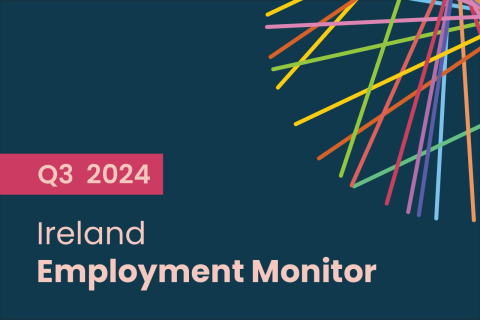Skills-based hiring: The why, the what and the how

With skills shortages prevalent in many industries across most of the world, hiring managers are feeling the pressure to fill positions. However, more often than not they are receiving applications from candidates who do not match the job description requirements. A switch to skills-based hiring could be the solution...
Skills-based hiring practices are increasing. It's a trend in the recruitment landscape that has been accelerated in recent years. Traditional recruitment strategies are being replaced with new recruitment strategies that are better suited to attracting the right talent, with the most suitable skills.
The companies recruiting employees based on demonstrated skills and not education or qualifications are seeing a dramatic improvement of their overall performances, as well as in other key areas such as creating more diverse talent pools, better retention rates and a reduction in time to fill historically tricky roles.
If we want to shape the workforce of the future, we need to hire for skills of the future.
The why: Skills-based hiring improves diversity and retention
When it comes to finding the right person for a role, talent teams need to hire people who can get the work done; people who have the right skill set to get the job done. It’s important to remember that how they have acquired those skills doesn’t matter.
Microsoft and LinkedIn helped 250,000 companies make a skills-based hire in 2021.
Employees without a degree tend to stay 34% longer than employees with a degree.
If you continue to evaluate resumes and people based on whether they have a degree or whether they went to a prominent university or college instead of focusing on their skill sets, you’re missing out on a much wider, more diverse talent pool.
You’d be surprised to discover how many highly talented professionals are sitting outside your traditional talent pools. This is largely down to the accessibility of online courses and the rise of ‘learning on the job’. Consequently, more and more people are developing business critical skills without attending university.
The what: What are the skills of the future?
The benefits of skills-based hiring are huge, but what are the skills hiring managers should be looking for to shape a workforce that is equipped to thrive in the future? (We will dive deeper into how to hire for those skills in the next section...)
Below are the top 15 skills employers have identified to be of rising importance by 2025.
Top 15 skills of the future
- Analytical thinking and innovation
- Active learning and learning strategies
- Complex problem-solving
- Critical thinking and analysis
- Creativity, originality and initiative
- Leadership and social influence
- Technology use, monitoring and control
- Technology design and programming
- Resilience, stress tolerance and flexibility
- Reasoning, problem-solving and ideation
- Emotional intelligence
- Troubleshooting and user experience
- Service orientation
- Systems analysis and evaluation
- Persuasion and negotiation
There are similarities across industries when looking at increasingly strategic and increasingly redundant job roles.
Similar to previous years, roles such as Data Analysts and Scientists, AI and Machine Learning Specialists, Robotics Engineers, Software and Application Developers and Digital Transformation Specialists remain in growing demand.
Jobs of tomorrow
The World Economic Forum’s Jobs of Tomorrow report presents a way to measure and track the emergence of new jobs using real-time labour market data.
The report, in collaboration with LinkedIn, Coursera and the World Economic Forum, identified 99 jobs that are consistently growing in demand across 20 economies.
Those jobs were categorised into professional clusters according to their similarity of skills:

The how: How to adopt skills-based hiring?
Digital and technological disruption is ranked as a top priority for business leaders, followed by attracting the talent that will make this transformation possible. This continues to be a challenge as businesses across multiple industries are facing skills shortages.
Employers see ‘skill gaps in the local labour market’ and the ‘inability to attract specialised talent’ as the main barriers to adopting new technologies.
Some organisations are therefore providing access to resources for reskilling and up-skilling to their current workforce. This approach is dependent on employees also embracing these opportunities.
What can hiring managers do today to shift their focus to skills-based hiring?
1. Start by rethinking your company’s job descriptions and job posts
Instead of starting your recruitment process by creating job description that list all the job requirements, think about what skills are required to do the job. Put the focus on the responsibilities the person will have in the role and what skills they will have to use in their daily tasks.
When writing your job description, think about what results you expect the person to deliver in this role.
LinkedIn conducted a job description heat map study that highlighted what job seekers were most interested in when reviewing potential opportunities. One of the key findings was that - apart from salary and compensation benefits - job seekers were interested in what success looks like in the role.
2. Perform a job analysis to understand the skills a role requires
Hiring managers should work closely with the team or manager they are hiring for to really understand what skills are important for the role and how to assess those skills. This means identifying all the skills required for the role: technical skills, hard skills and soft skills.
By going through this process, talent teams are better positioned to conduct a skills assessment that will help you find the best talent.
3. Incorporate skills assessment into the application process
It could well be time to review your interview process: What questions are you asking? How are you assessing if someone is really the right fit for the role?
There are a number of different interview techniques that are better suited to assess skill sets such as job auditions, soft skills assessments or even virtual reality assessments.
Final thoughts
Skills-based hiring is the future of hiring and, if embraced, will help shape the workforce of tomorrow.
Hiring managers and talent teams will quickly see results from skills-based hiring and its ability to attract top talent to your organisation.














